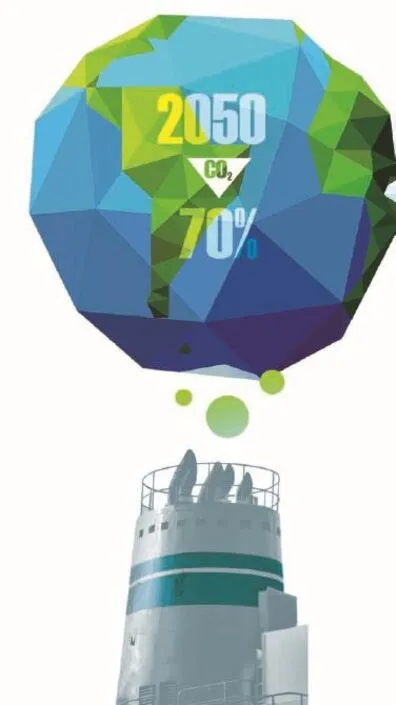2050 for the shipping industry
Reporter Zhao Bo
On April 13, 2018, London, United Kingdom,the 72ndMeeting of the IMO Maritime Environment Protection Committee (MEPC 72) fi nally formed and adopted the fi rst initial strategy in shipping industry history to reduce shipping CO2and greenhouse gas emissions.

For the shipping industry emission reduction targets that are of particular concern to the industry,there are three main conclusions: First, to further implement and comply with the requirements of the Ship Energy Efficiency Design Index (EEDI), to reduce the carbon emission intensity of ships, and to apply a 20% offset from the baseline for ro-ro transport ships and passenger and cargo ro-ro ships. Second, to reduce carbon dioxide emissions from the global shipping industry, by 2030,the carbon dioxide emissions per transport work should be at least 40% lower than in 2008, and they will strive to achieve a 70% reduction in 2050. Third, by 2050, the annual global emissions of GHGs in the shipping industry will be at least 50% lower than in 2008. At the same time, it is consistent with the clear temperature control objectives of the Paris Framework convention on Climate Change and will strive to realize the ultimate vision of no GHG emissions in the shipping industry in this century. In the next five years, countries will also hold consultations on concrete measures to achieve the goal, with a view to reaching a fi nal emission reduction strategy by 2023.
There are reports that some Parties disagree with the goal of this preliminary emission reduction strategy. Representatives like Saudi Arabia, India, Argentina,and Brazil hope that the meeting will establish a more fl exible emission reduction schedule and a more relaxed emission reduction plan in the greenhouse gas emissions reduction of the shipping industry. Considering the geographical location is far from other markets,Argentina and Brazil believe that some emission reduction measures (such as slowdown sailing) will cause their trade (especially for fresh product exports)to be in a more unfavorable competitive position. On the contrary, some island countries, such as the Marshall Islands who are under pressure from the rise of global sea level caused by the greenhouse effect request global shipping companies to take action as soon as possible.The EU’s enthusiasm for shipping emissions is naturally far higher than other countries and regions. EU member states even propose to reduce greenhouse gas emissions by 70% to 100% in 2050.
Some national representatives also hoped to slow down the implementation of shipping emission reduction schedule because they qualified opinions on some of the figures mentioned in The Third IMO Study of Greenhouse Gases In 2014. Observers expressed on social media that some developing countries and Asian countries think that some statements such as “With the growth of global trade, it is expected that by 2050,annual greenhouse gas emissions from the shipping industry will increase by 50% to 250% over the current period, accounting for 17% of the total global greenhouse gas emissions.” fail to fully consider the low freight demand and excess capacity in previous years as well as unpredictable shipping crises that may occur in the future. In the absence or opacity of relevant data, the tightening emission policy ref l ected in the preliminary emission reduction strategy is somewhat appropriate and may be detrimental to its export economy.
Tristan Smith, a lecturer at the University of London College (UCL) Institute of Energy and Shipping, retorted through an analysis: "Even if some representatives of the country stated that the starting point of this preliminary emission reduction strategy is at a high level, the strategy though considered to be consistent with Paris Framework convention on Climate Change is not enough to ensure the shipping industry achieves its goal that keep the rise of global average temperature within 2 degrees Celsius(on the basis of the industrialization level) and strive to keep it within 1.5 Celsius.
The International Commission on Cleaner Transport(ICCT) also issued a report saying that if it is to achieve the same objectives as the Paris Framework convention on Climate Change, the shipping industry's greenhouse gas emissions from 2015 cannot exceed 17 billion tons of carbon dioxide equivalent, but according to preliminary emission reduction strategy, it may be between 28 billion and 43 billion tons. Therefore, IMO should propose a higher goal. While the International Shipping Association(ICS) praised the IMO’s efforts, it also expressed its support for continued efforts to reduce shipping emissions.
In any negotiation, there will be a focus of debate. It is also true that the agreement that is finally reached will be recognized by the relevant parties and will promote the development of the industry. As the representative of China said, the preliminary emission reduction strategy which is insightful, detailed and all-inclusive conveys to the world a powerful signal that the shipping industry is moving towards a “Zero Carbon Emission”.

